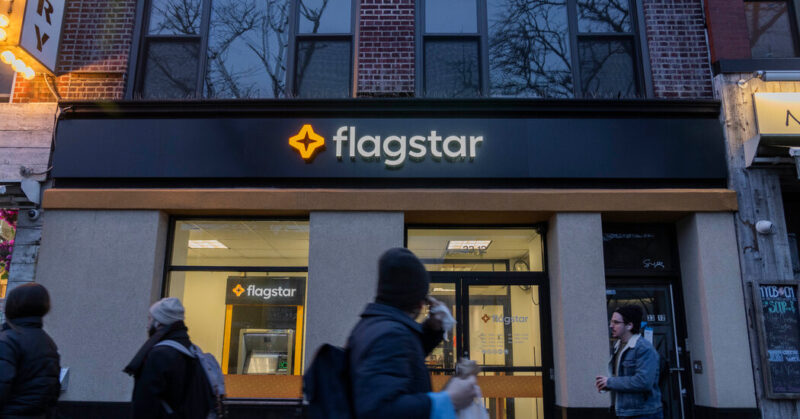Former Treasury Secretary Steven Mnuchin swooped in to rescue New York Community Bank on Wednesday, leading a group of investors who injected more than $1 billion into a lender flailing from its exposure to a softening real estate market and internal management mistakes.
Mr. Mnuchin, through his private equity firm, Liberty Street Capital, put up $450 million, with other investors, including the billionaire Kenneth Griffin’s hedge fund Citadel, throwing in the rest. As part of the deal, NYCB will also get its third chief executive in a month — Joseph Otting, a longtime banking executive and close ally of Mr. Mnuchin.
The new cash is aimed to shore up a bank that has lurched from shock to shock this year, and that attracted the attention of regulators in Washington eager to avoid another banking crisis close to the one-year anniversary of the collapse of Silicon Valley Bank.
Mr. Mnuchin, a Wall Street veteran who served as President Donald J. Trump’s Treasury secretary, said in a statement on Wednesday that while he was “mindful of the bank’s credit risk profile,” he believed that NYCB had “a strong foundation for future growth.”
The troubles at New York Community Bank began when it posted a $240 million loss in its most recent earnings report in January, mostly tied to real estate loans, as the market continues to soften with high vacancy rates in apartment and office buildings after the rise of remote work. The bank was also hammered by its outsize concentration in loans to rent-regulated apartments, whose values have suffered because of laws that restrict their ability to profitably improve the properties.
The lender’s results surprised analysts and investors, causing its stock to tank swiftly and raising even more worries about its financial health. It didn’t help that just last week, NYCB replaced its chief executive, Thomas R. Cangemi, after disclosing billions of dollars in additional write-downs dating back years, and said it would investigate whether reams of earlier financial disclosures had been accurate. Several credit ratings firms also downgraded the bank.
The Long Island-based lender, which operates more than 400 branches including Flagstar Bank, a large mortgage servicer, grew quickly over the past year after acquiring a large chunk of the assets of Signature Bank, another bank that collapsed during last March’s banking crisis.
Mr. Cangemi, who led NYCB’s purchase of Signature assets before stepping down, publicly blamed the pressures of becoming so large so quickly for its recent travails. He said it was forced to comply with regulations that it would not have been subject to as a smaller bank.
David Smith, a researcher at Autonomous, told clients that his first reaction to Wednesday’s news was that it was a move of “desperation” by NYCB, but later concluded it was “the brightest ray of hope” the bank had seen in months.
Mr. Otting, the new chief executive, and Mr. Mnuchin have a long history. In 2010, Mr. Otting was hired to run OneWest, a struggling California lender that Mr. Mnuchin had purchased with others after the 2008 financial crisis. In 2015, Mr. Otting left OneWest after CIT Group bought it.
In 2017, Mr. Otting became the comptroller of the currency, overseeing one of the banking industry’s primary regulators. Mr. Mnuchin was Treasury secretary at the time.
Mr. Otting was a controversial figure in government, feuding with other regulators and angering critics who said his proposals would have defanged rules requiring banks to invest in poor communities and lend to low-income individuals.
The investment came together quickly over the past five days, a person involved in the negotiations said. The private equity firms Hudson Bay and Reverence Capital are among the investors in the deal. Mr. Mnuchin and Mr. Otting will join the bank’s board, along with representatives of the two private equity firms.
The Wall Street Journal reported earlier that NYCB was seeking to raise capital, after which the bank’s shares plummeted so steeply that the New York Stock Exchange halted trading. But when trading resumed after the bank’s public announcement of the overhaul, NYCB shares soared and then fell, ending the day with a 7 percent gain.
They remain down nearly 67 percent this year.
NYCB had $83 billion in deposits and more than $100 billion in overall assets as of last month. Flagstar is one of the nation’s larger mortgage servicers, tying the bank’s fate relatively closely to that of the housing market.








